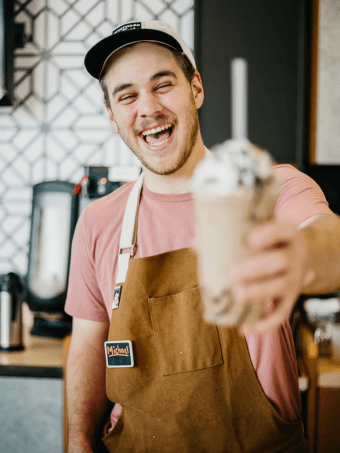OK Go is an American indie rock band which formed in Chicago, Illinois, United States in 1998. The band consists of Damian Kulash (guitar, vocals), Tim Nordwind (bass), Andy Ross (guitar, keyboards), and Dan Konopka (drums). The band is best known for their singles "Get Over It", "A Million Ways", "Here It Goes Again" and "This Too Shall Pass" and for their high concept, low budget, one-shot music videos. Over the years, the band has worked with companies like State Farm, Chevrolet and Morton Salt to create elaborate music videos that reliably go viral, so it is anything but stranger to brand deals.
OK Go are being sued by a Battle Creek-based cereal company, Post Foods, over the right to continue using the band’s name for a range of instant cereal cups. Post filed an application with the U.S. Patent and Trademark Office (USPTO) last spring that was approved by the end of August. In September, a lawyer for the American band demanded Post Foods abandon its trademark, claiming that the OK GO mark has developed a significant reputation over the years and is linked with the American band in the eyes of consumers.
According to the company’s filing in Minnesota federal court, Post Foods claims it resorted to taking the matter to the courts because the band had been threatening to sue it for months over the product, and the company would be unfairly forced to continue investing in its new OK GO! brand while under the constant threat of unfounded future litigation with the American band. According to Variety, Post’s lawyers have also stated in their complaint that Post offered to pay for a brand collaboration/co-marketing arrangement but that the band refused.
The lead singer of OK Go, Damian Kulash, made a statement to Billboard saying that, “A big corporation chose to steal the name of our band to market disposable plastic cups of sugar to children. That was an unwelcome surprise, to say the least. But then they sue the U.S. about it? Presumably, the idea is that they can just bully us out of our own name since they have so much more money to spend on lawyers? I guess that’s often how it works, but hopefully, we’ll be the exception.”
Likelihood of confusion
The primary purpose of a brand is to distinguish the company's goods and services from those of its competitors. Customers believe that the brand offers the preferable features, images, or standards of quality at the right price. In order to maintain that reputation, brands tend to be wary of potential confusion between similar trademarks. For that reason, most trademark opposition cases revolve around the concept of "likelihood of confusion." A number of factors play into determining the likelihood of confusion, including how distinctive the name/logo is, how similar it is to the opposing trademark, and how similar the products or services are. As the likelihood of confusion argument presents an easier avenue for resolving disputes, many famous brands are keen on using it to deter potential competitors from trying to leverage their name.
Trademark registration is a key step in protecting the company's intellectual property rights and the brand's reputation. With a registered trademark, business owners have legal means to protect distinctive brand assets, such as the company's name and logo, from any infringement attempts, ensuring that their image and reputation gained from the customers remain associated solely with the original brand. Trademark law strongly prioritizes companies that filed the trademark application first, even if the registration process was not yet completed. As a result, it is generally advisable to check for the existence of similar trademarks prior to starting with the registration.


